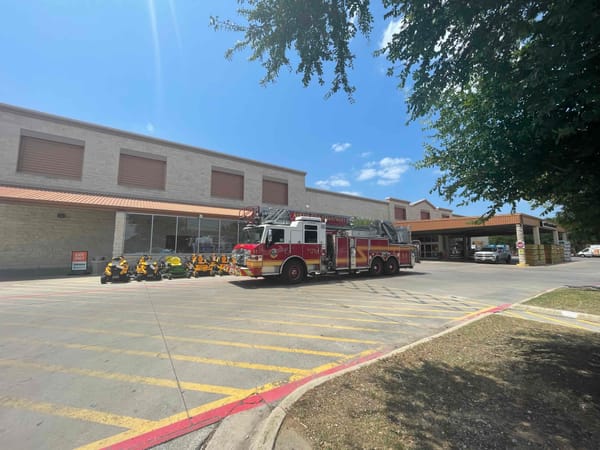A bizarre exercise in public comment
Unnecessary in one sense, necessary in another.

The photo above displays the bizarre set up in City Council chambers today. Most of Council is obscured by the Planning Commission, which is seated in front at two rows of black tables. I don't understand what the fencing between the commission and Council is about. I strongly believe that the next time they do this the commissioners should sit on the floor, cross-legged, in front of the dais.
I do want to stress that this unprecedented joint meeting is a deeply stupid exercise only occurring to comply with a really weird, illogical provision of state law (scroll to 2nd article). I'm glad the city is covering its bases by doing it, but there is nothing about it that provides more public input or transparency than the normal processes.
The meeting began promptly at 2 pm with a relatively short presentation from city staff on the proposed zoning changes. Three likely opponents of the reforms –– Council Member Alison Alter and Commissioners Grayson Cox and Jennifer Mushtaler –– made comments and asked questions of staff but both City Manager Jesus Garza and Planning Commission Chair Todd Shaw politely but firmly suggested that policymakers shut up and let the public comment proceed so that the meeting doesn't stretch into the brunch hour tomorrow.
It's a credit to Garza that he made the request –– his predecessor certainly wouldn't have. Of course, it's probably not a request that Kathie Tovo or Ann Kitchen would have abided anyway.
And then the People spake. And spake and spake. Some eloquently, some incoherently. Some came armed with facts, others with delusions. Much of what was said was valuable, but none of it was new.
And of course, people will have a chance to speak again when the Planning Commission actually takes up the ordinance on Nov. 14 and when Council takes it up on Dec. 7.
An update on the fight over police transparency
Last month, the state attorney general delivered a starting response to a request for legal guidance from the city of Austin. Based on the information provided by city attorneys, the AG determined that the Austin Police Department could no longer maintain a "G File" of secret personnel records for police officers. Due to voters' approval of the Austin Police Oversight Act in May, said the AG, the city must release the personnel records of Officer Christopher Taylor, the officer now on trial for murder.
The biggest beef reform advocates have with the G File is that it is where records of investigations go if they don't result in disciplinary action. Activists argue that this creates an incentive for police chiefs to not discipline officers if the investigation unearths any information that could embarrass the department.
Even some of the staunchest opponents of the G File were caught off guard by the AG opinion, and suggested it was the result of the city providing the state with incomplete information in its request.
Lo and Behold, last week the attorney general's office issued a new opinion, affirming the police department's right to keep certain personnel records secret.
The city of Austin's legal department has always argued that it has no choice but to maintain a G File. It points to Chapter 143.089 of the Texas Local Government Code, which lays out how certain cities (more on that later) must handle personnel records for cops and firefighters.
The law states that the police chief "shall" maintain a personnel file on each fire fighter and police officer that includes employee evaluations, commendations, and any misconduct allegations that result in disciplinary action. Any misconduct allegations that do not result in discipline cannot be placed in this file, which is informally known as the A File (because it's sub-section (a) of the law)
A later section of Chapter 143 states that the department "may" maintain a personnel file "for the department's use," the contents of which may not be released "to any agency or person." This is the infamous G File.
Transparency advocates point to the word "may" and conclude that the police department is under no obligation to put any records into a secret file. However, the law department has in the past argued that if the law doesn't allow allegations of misconduct that don't result in discipline to be included in the A File, the city has no choice but to put them in another file –– and that state law requires that file to be secret.
Now, however, city attorneys are making an even more radical argument. The Chronicle reports:
In a surprising admission, the city’s Law Department now contends that creation of the G file is itself optional, because the statute allowing it uses the word may when outlining authority around creating a G file. ....But, Coppola argued, that discretionary authority is granted only to a city’s police department – not to the city itself.
If borne out, this theory would have striking implications for who holds power within local government. Unlike county sheriffs, who are elected officials and thus enjoy independent authority granted to them by the Texas Constitution, municipal police chiefs are city employees who are generally bound by policies and ordinances enacted by municipal government.
Under Austin’s council-manager form of government, City Council sets policy and the city manager implements it. Police department policy falls within that purview; the police chief is subordinate to the city manager, who is subordinate to the 11 members of City Council, who, of course, are elected by Austin voters. In essence, then, the city is arguing that, in this specific policy matter, the people of Austin do not have authority over their police chief.
Wow.
The issue of the G File has been raised by the passage of the APOA, as well as by the trial of Christopher Taylor, the APD officer charged with killing Michael Ramos in the spring of 2020. The judge presiding over the trial has cited state law in rejecting the district attorney's request to access Taylor's G File.
A bit of perspective...
The police association and its supporters argue that the G File is absolutely necessary to protect police officers' privacy and has made it a major sticking point in contract negotiations. They have suggested that efforts by activists here to open up the G File is radical and unprecedented, implying that it make it harder to recruit police officers.
It's important to note that most law enforcement agencies in Texas do not have G files. Sheriffs Departments don't have them, the Department of Public Safety, hardly a bastion of radical transparency, doesn't have them, and cities that are not subject to Chapter 143, such as Dallas, don't have them.





